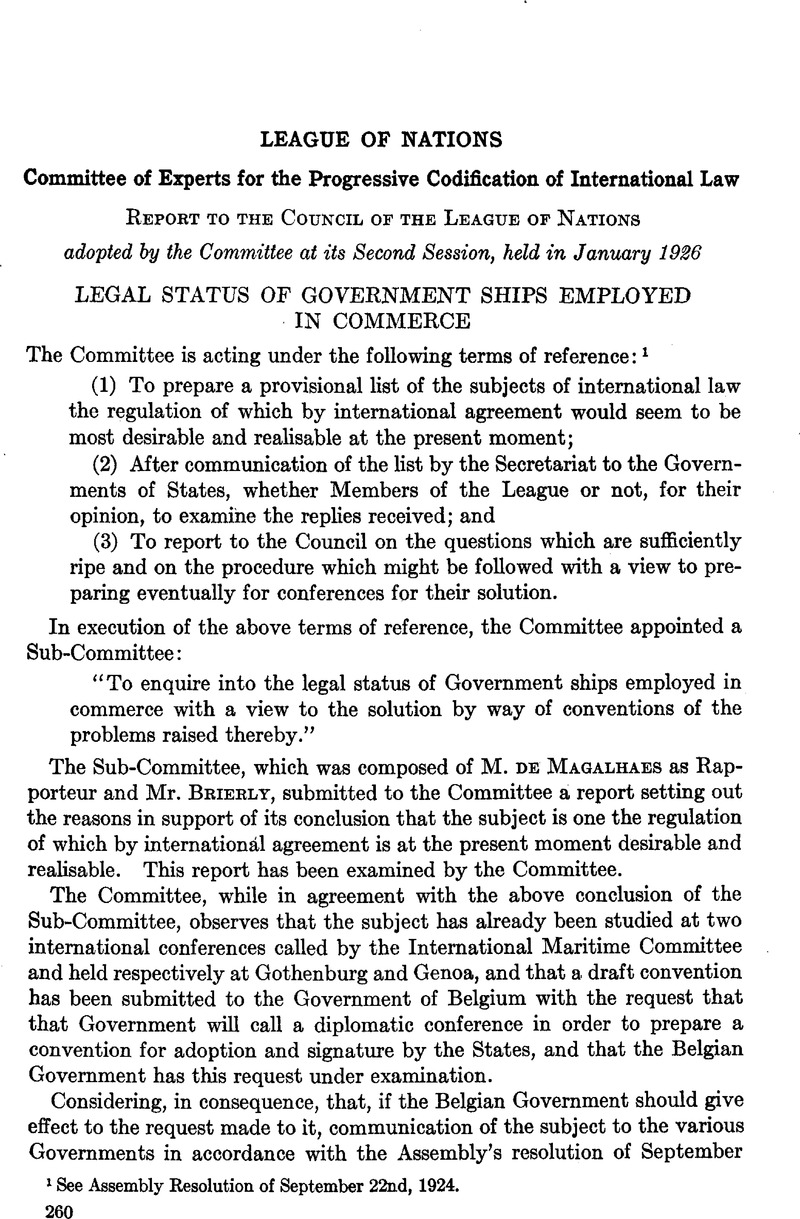No CrossRef data available.
Article contents
Report to the Council of the League of Nations adopted by the Committee at its Second Session, held in January 1926 Legal Status of Government Ships Employed in Commerce
Published online by Cambridge University Press: 04 May 2017
Abstract

- Type
- Second Session of the Committee of Experts for the Progressive Codification of International Law
- Information
- American Journal of International Law , Volume 20 , Issue S5: Supplement: Codification of International Law , October 1926 , pp. 260 - 278
- Copyright
- Copyright © American Society of International Law 1926
References
1 See Assembly Resolution of September 22nd, 1924.
1 Note.–The official English texts of the passages quoted have been used where possible; such texts are unfortunately not available to the Secretariat for the Genoa Conference.
1 French text published in the Revue de droit maritime comparé, Vol. IV, page 595, and in the Bulletin du comité maritime international No. 65 (French edition), page VI; English text in the Bulletin of the International Maritime Committee No. 65 (English edition), page VI.
1 This word does not appear in the French text.
1 The provisional translation of the English text as circulated at the Genoa Conference reads: “autres bâtiments appartenant à un gouvernement ou exploités par lui et affectés exclusivement à un service autre qu’un service commercial.” The original English text is as follows: “and other vessels owned or operated by the State and employed in other than commercial work.” We consider that the translation adopted ought to be: “et autres navires possédés ou exploités par l’Etat, et affectés exclusivement à un service autre qu’un service commercial.”
1 In the Report of the Italian Association for Maritime Law at the Genoa Conference, Professor Berlingieri gave a summary of a treatise which Professor Fedozzi had written on the Gothenburg Draft, and pointed out that the draft in question failed to provide a solution for a question of the first importance, i.e., whether a judge who has to determine the nature of the work for which a ship is employed is bound to be guided by the fact that she is classed as a public vessel by the laws or Government regulations of the State to which she belongs, and whether he is therefore precluded from entertaining other considerations. After some very pertinent reflections on this point, the learned Professor concludes in favour of the principle of applying the legislative standards recognized in the country in which the case is tried (lex fori). The Conference did not see the need of making this distinction in the draft Convention, and we ourselves do not see any such need, especially in view of the arguments already contained in the Report in favour of this system, and the fact that this question was so clearly put before the Conference both by M. Franck and by the Rapporteur of your Sub-Committee.
1 The final text is to be determined by the “Bureau permanent du comité maritime international.” Furthermore, as we have already pointed out, the French translation of the English text of the resolution is also provisional.
1 English text printed from the Bulletin of the International Maritime Committee (English edition), page VI.
1 As we said in our report, this provision, which was proposed by the French Maritime Law Association, was approved by the Genoa Conference, and the Permanent Bureau was to insert it in the draft. We do not understand why it is not included in the Bureau’s circular letter reproduced in Appendix II.


